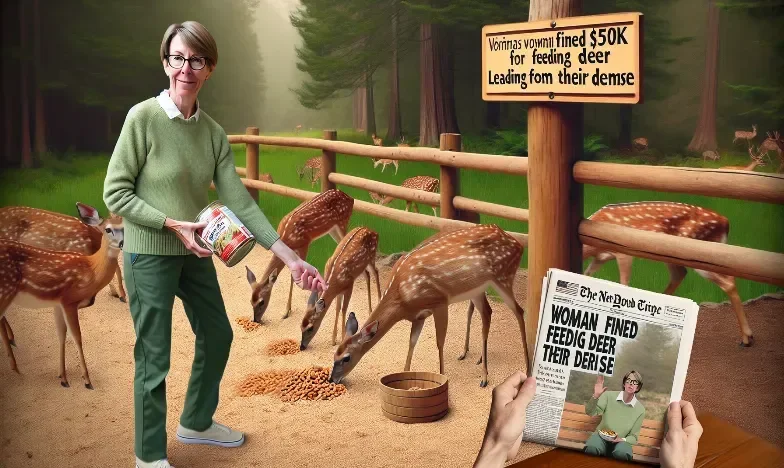Woman Fined $50k for Feeding Deer, Leading to Their Demise
Delilah, a resident of a small town in Oregon, always had a soft spot for animals. She lived on the edge of a forest and often enjoyed watching the local wildlife from her porch. One winter, she noticed a group of deer struggling to find food in the snow-covered landscape. Moved by their plight, Delilah decided to help by leaving out food for them.
At first, it seemed like a kind gesture. The deer began to frequent her yard, munching on the fruits and vegetables she provided. Delilah felt a sense of satisfaction, believing she was making a positive impact on their lives. She even named a few of the regular visitors: Billy, Kyle, and Brandon.
However, Delilah’s actions did not go unnoticed. Neighbors began to complain about the increasing number of deer in the area. The animals were becoming bolder, venturing into gardens and causing damage to property. Some residents were concerned about the potential for car accidents as the deer started crossing roads more frequently.
Despite the growing concerns, Delilah continued to feed the deer, convinced she was doing the right thing. She even posted pictures on social media, proudly showcasing her efforts to help the local wildlife. Her posts garnered mixed reactions; while some praised her compassion, others warned her about the potential consequences.
Three years later, Delilah’s good intentions came back to haunt her. Wildlife officials received numerous complaints about the deer population in the area and launched an investigation. They discovered that Delilah’s feeding had disrupted the natural behavior of the deer, making them dependent on human-provided food.
The situation took a tragic turn when several deer were found dead near Delilah’s property. An autopsy revealed that they had ingested food that was not suitable for their diet, leading to severe health issues and ultimately their demise. The officials were left with no choice but to take action.
Delilah was fined $50,000 for her actions, a hefty sum that left her in shock. She had never imagined that her attempts to help would lead to such dire consequences. The fine was meant to serve as a deterrent to others who might consider feeding wildlife without understanding the potential risks.
In addition to the financial penalty, Delilah was required to attend a series of educational workshops on wildlife conservation. She learned about the importance of allowing animals to find their own food and the dangers of human interference in their natural habits.
Reflecting on her experience, Delilah expressed deep regret for her actions. “I thought I was helping them,” she said tearfully. “I never wanted to cause any harm. I just wanted to make sure they had enough to eat.”
The incident served as a stark reminder of the complexities involved in interacting with wildlife. While it is natural to feel compassion for animals in distress, it is crucial to understand the broader implications of our actions. Feeding wildlife can disrupt their natural behaviors, make them dependent on humans, and even lead to their death.
Delilah’s story spread through the community and beyond, sparking discussions about responsible wildlife interaction. Local authorities emphasized the importance of contacting wildlife experts before taking any action and encouraged residents to support conservation efforts through proper channels.
In the end, Delilah’s experience became a valuable lesson for everyone involved. It highlighted the need for education and awareness when it comes to helping wildlife and underscored the importance of respecting nature’s delicate balance.
